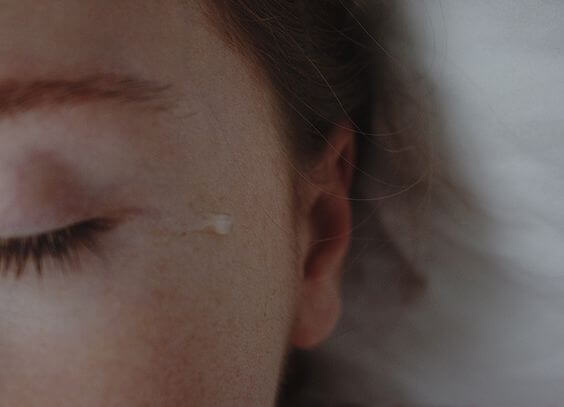Suffering In Silence, Such a Human Thing


Written and verified by the psychologist Valeria Sabater
We’re social beings, and yet most of us choose to suffer in a solitary way. We prefer to share laughter, good moments.
We stick to routines with the people around us because that’s how we feel like we have a certain amount of control. As if nothing were devouring us inside.
Something both psychologists and psychiatrists are well aware of is that trauma and silence almost always go hand-in-hand. It’s not easy to talk out loud about the thing hurting us.
There are two specific reasons why: we’re afraid of being judged, and above all, showing our vulnerability. Because in this ruthless world it’s the strong personalities that win. The ones that put up with everything, don’t complain, and instead are models of optimism and self-confidence.
It’s devastating to realize that in today’s world suffering is still a stigma. Unfortunately there are so many people with depression that are still going without treatment. In fact, the suicide rate among young people has soared to worrying heights.
Take a second to think it.

Reasons you Should NOT Suffer in Silence
Not long ago, a well-known paper published the personal letter of a woman who said she could no longer go on with her life. She had become a mother for the third time and felt like she couldn’t get out of bed. Strange as it may seem, almost 80% of the comments were purely derogatory, occasionally bordering on cruelty.
Postpartum depression is still an almost taboo subject even today. If a woman experiences this mood disorder after giving birth, she’s immediately stigmatized.
Because what society expects from her is for her to be perfect and happy. So sadly a lot of mothers go through this period behind closed doors, in a private and almost brutal way. All because they fear the world’s criticism.
The same thing happens with teenagers. Boys and girls that are victims of bullying, suffering in silence, not asking for help. They hide in the loneliness and privacy of their rooms, the only place they feel safe. It’s not enough.
We must act before it’s too late. Before our will gets even weaker and our life feels pointless.

6 Reasons We Should Stop Suffering in Silence
The first reason to stop suffering in silence is simple and obvious. If you don’t the suffering will keep on going. If you don’t take the step to ask for help, the pain will just get worse. It will be a long, suffocating, destructive silence.
- The symptoms will become even more resistant. We’ll stop being people and turn into pain. Symptoms will get much more complex.
- Negative thoughts will intensify. We’ll be trapped in our own personal prison cell.
- A moment will come when social contact will be uncomfortable for us, and we’ll reject it. Hugs, emotional affection, and friendly words will lose their meaning. We’ll look at them with suspicion and interpret them as threats.
- Postponing the need to ask for help will make it harder to treat.
- We are perpetuating the stigma. By not taking the step, by not letting ourselves get professional help or communicating what’s happening to us to someone we trust, we’re just feeding the idea that trauma and suffering go hand-in-hand with silence.
Connecting in Order to Cure
Suffering isolates us, but connecting with our fellow humans and ourselves is therapeutic. When we share our vulnerabilities and pain with the right person, or a well-qualified professional, we take two steps forward.
The first is because we’ve stopped sabotaging ourselves. No one chooses to go through postpartum depression. No one deserves to be a victim of bullying, or slave to a traumatic past or a lost childhood. And no one deserves to take such bad care of themselves that they don’t love themselves anymore.

The second benefit we’ll get out of it is emotional catharsis. A lot of people come to psychotherapy dressed in the armor of rage. They’re really just hiding their vulnerability.
Eventually therapy will encourage reconciliation and appropriate connection with their surroundings. And then they’ll let their chains fall away bit by bit.
It’s a slow, tedious process, there’s no doubt about that. But it’s something we all deserve: to stop suffering in silence and to have someone who understands us and helps us.
Let’s take a second to think about that. Let’s come out of loneliness so that we can be ourselves again, without fear.
Last but not least, we must remember that suffering changes us. It chisels away at us until we turn into different person. We’ll stop being true to ourselves. And that — that’s something no one deserves.
We’re social beings, and yet most of us choose to suffer in a solitary way. We prefer to share laughter, good moments.
We stick to routines with the people around us because that’s how we feel like we have a certain amount of control. As if nothing were devouring us inside.
Something both psychologists and psychiatrists are well aware of is that trauma and silence almost always go hand-in-hand. It’s not easy to talk out loud about the thing hurting us.
There are two specific reasons why: we’re afraid of being judged, and above all, showing our vulnerability. Because in this ruthless world it’s the strong personalities that win. The ones that put up with everything, don’t complain, and instead are models of optimism and self-confidence.
It’s devastating to realize that in today’s world suffering is still a stigma. Unfortunately there are so many people with depression that are still going without treatment. In fact, the suicide rate among young people has soared to worrying heights.
Take a second to think it.

Reasons you Should NOT Suffer in Silence
Not long ago, a well-known paper published the personal letter of a woman who said she could no longer go on with her life. She had become a mother for the third time and felt like she couldn’t get out of bed. Strange as it may seem, almost 80% of the comments were purely derogatory, occasionally bordering on cruelty.
Postpartum depression is still an almost taboo subject even today. If a woman experiences this mood disorder after giving birth, she’s immediately stigmatized.
Because what society expects from her is for her to be perfect and happy. So sadly a lot of mothers go through this period behind closed doors, in a private and almost brutal way. All because they fear the world’s criticism.
The same thing happens with teenagers. Boys and girls that are victims of bullying, suffering in silence, not asking for help. They hide in the loneliness and privacy of their rooms, the only place they feel safe. It’s not enough.
We must act before it’s too late. Before our will gets even weaker and our life feels pointless.

6 Reasons We Should Stop Suffering in Silence
The first reason to stop suffering in silence is simple and obvious. If you don’t the suffering will keep on going. If you don’t take the step to ask for help, the pain will just get worse. It will be a long, suffocating, destructive silence.
- The symptoms will become even more resistant. We’ll stop being people and turn into pain. Symptoms will get much more complex.
- Negative thoughts will intensify. We’ll be trapped in our own personal prison cell.
- A moment will come when social contact will be uncomfortable for us, and we’ll reject it. Hugs, emotional affection, and friendly words will lose their meaning. We’ll look at them with suspicion and interpret them as threats.
- Postponing the need to ask for help will make it harder to treat.
- We are perpetuating the stigma. By not taking the step, by not letting ourselves get professional help or communicating what’s happening to us to someone we trust, we’re just feeding the idea that trauma and suffering go hand-in-hand with silence.
Connecting in Order to Cure
Suffering isolates us, but connecting with our fellow humans and ourselves is therapeutic. When we share our vulnerabilities and pain with the right person, or a well-qualified professional, we take two steps forward.
The first is because we’ve stopped sabotaging ourselves. No one chooses to go through postpartum depression. No one deserves to be a victim of bullying, or slave to a traumatic past or a lost childhood. And no one deserves to take such bad care of themselves that they don’t love themselves anymore.

The second benefit we’ll get out of it is emotional catharsis. A lot of people come to psychotherapy dressed in the armor of rage. They’re really just hiding their vulnerability.
Eventually therapy will encourage reconciliation and appropriate connection with their surroundings. And then they’ll let their chains fall away bit by bit.
It’s a slow, tedious process, there’s no doubt about that. But it’s something we all deserve: to stop suffering in silence and to have someone who understands us and helps us.
Let’s take a second to think about that. Let’s come out of loneliness so that we can be ourselves again, without fear.
Last but not least, we must remember that suffering changes us. It chisels away at us until we turn into different person. We’ll stop being true to ourselves. And that — that’s something no one deserves.
This text is provided for informational purposes only and does not replace consultation with a professional. If in doubt, consult your specialist.







